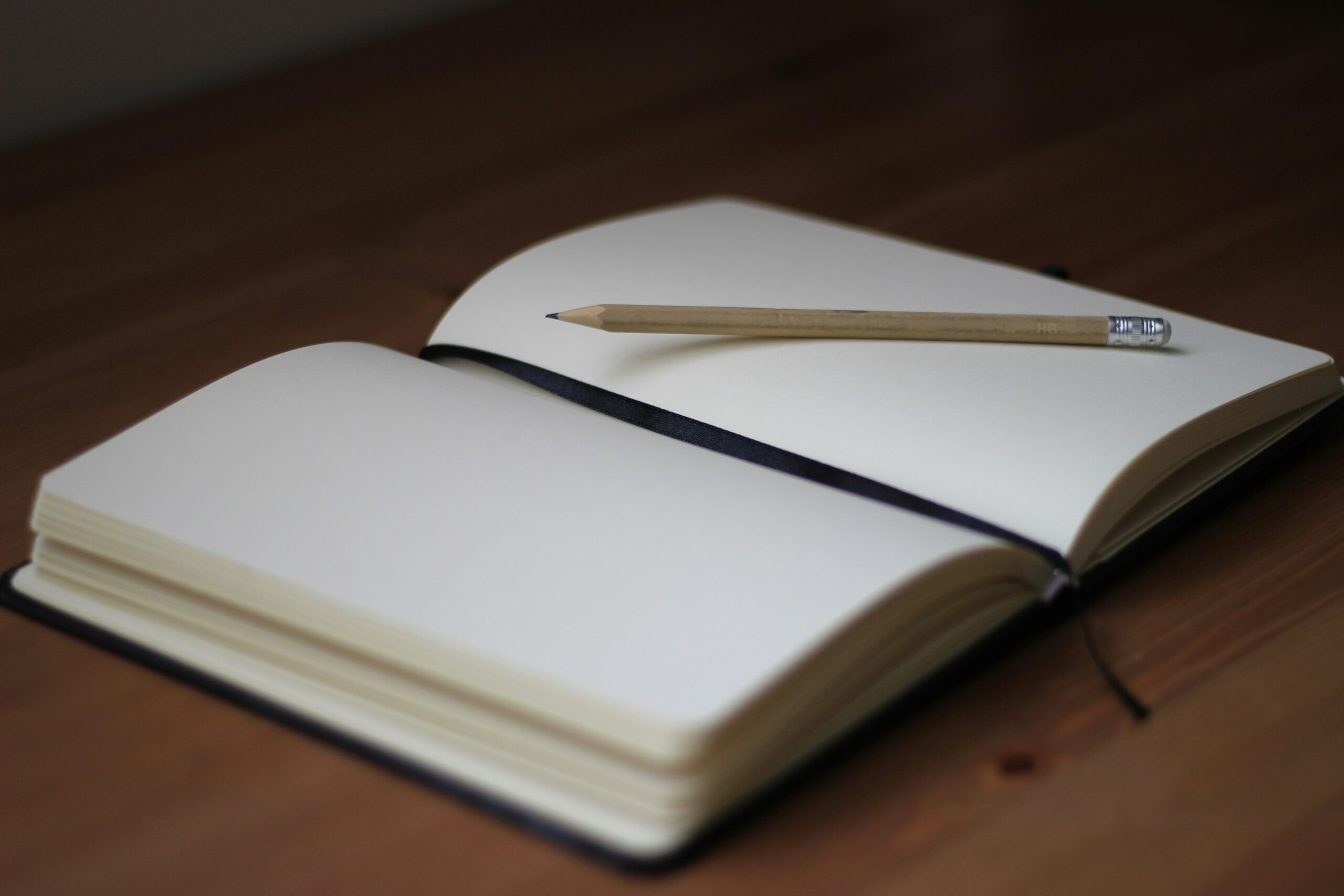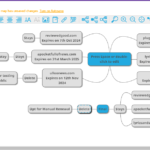Note - This article is a test post - objective is not to use and Rank Math tools and SEO plugins and observe if Google algorithms finds, understands and finds the content helpful and then finds it good enough to be displayed and to be ranked amongst the best top pages . This is part of the main Post which is a match referee between this post and the other which is Rank Math plugins and tools aided - should you want to go to that post and come back then click here
This post is akin to a kamikaze flight - a flight - a post which while content wise is not that bad , but is rude and is a non listener , which does not care about the rules of the space its flying in , nor does it seek help..neither does it care to evolve ..it flies into the sky..despite knowing that is doomed from the start and would be lost soon in thin air - with no recognition ..
Mindful journaling is a practice that combines mindfulness techniques with the act of journaling. Mindfulness involves being fully present and engaged in the moment, observing thoughts, feelings, bodily sensations, and the surrounding environment without judgment. Journaling, on the other hand, is the practice of writing down one’s thoughts, feelings, experiences, and reflections.
Mindful journaling typically involves setting aside dedicated time to engage in reflective writing while being mindful of one’s thoughts and feelings. Here’s how it generally works:
- Set the Intention: Begin your mindful journaling session by setting an intention. This could be to cultivate gratitude, explore emotions, gain clarity on a particular issue, or simply to be present and observe your thoughts without judgment.
- Grounding Techniques: Start by grounding yourself in the present moment. You can do this by focusing on your breath, observing your surroundings, or engaging in a short mindfulness meditation.
- Reflective Writing: Once you feel grounded, begin writing in your journal. Write freely and without censorship. Allow your thoughts and feelings to flow onto the page. You can write about anything that comes to mind, whether it’s daily experiences, emotions, challenges, or insights.
- Stay Present: As you write, try to stay present and mindful of your thoughts and feelings. Notice any judgments or criticisms that arise and let them pass without getting caught up in them.
- Practice Gratitude: Many mindful journaling practices include a gratitude component. Take time to reflect on things you’re grateful for and write them down. This can help shift your focus toward the positive aspects of your life.
- Reflect and Review: After your journaling session, take a moment to reflect on what you’ve written. Notice any patterns, insights, or revelations that emerge from your writing. This reflection can help deepen your understanding of yourself and your experiences.
Overall, mindful journaling can be a powerful tool for self-discovery, stress reduction, and personal growth. It allows you to cultivate greater awareness of your thoughts and feelings while also providing a space for reflection and insight.
Why is Mindful journaling a good practice ?
There are several compelling reasons why someone might choose to practice mindful journaling:
- Stress Reduction: Mindful journaling can help reduce stress by providing a space to process and release emotions, as well as gain perspective on challenging situations. Engaging in reflective writing can promote relaxation and calmness, which can in turn lower stress levels.
- Emotional Regulation: Writing about thoughts and feelings in a mindful way can help individuals better understand and regulate their emotions. By observing their inner experiences without judgment, people can develop greater emotional intelligence and resilience.
- Self-Discovery: Mindful journaling encourages self-exploration and introspection. By regularly reflecting on thoughts, experiences, and values, individuals can gain deeper insights into themselves, their beliefs, and their motivations.
- Clarity and Focus: Writing mindfully can help clarify thoughts and priorities, making it easier to focus on what truly matters. Journaling can serve as a tool for setting goals, making decisions, and organizing thoughts, leading to increased clarity and productivity.
- Enhanced Creativity: Engaging in mindful journaling can stimulate creativity and innovation. By giving space for free expression and exploration of ideas, individuals can tap into their creative potential and generate new insights and solutions.
- Gratitude and Positivity: Incorporating gratitude practices into mindful journaling can cultivate a more positive outlook on life. Reflecting on the things one is grateful for can shift focus away from negativity and foster a greater sense of appreciation and contentment.
- Self-Care: Mindful journaling is a form of self-care that allows individuals to nurture their mental and emotional well-being. Taking time for reflection and introspection can promote self-awareness, self-compassion, and self-acceptance.
Overall, mindful journaling offers numerous benefits for mental, emotional, and spiritual growth. It provides a simple yet powerful way to cultivate mindfulness, deepen self-awareness, and foster personal development.
What is required to practice Mindful Journaling ?
Practicing mindful journaling doesn’t require much in terms of materials or resources, but there are a few things that can enhance the experience:
- Journal or Notebook: Having a dedicated journal or notebook where you can write down your thoughts, reflections, and experiences is essential for mindful journaling. Choose a journal that feels comfortable and inviting to write in.
- Writing Utensils: Whether you prefer pen and paper or typing on a digital device, you’ll need writing utensils to record your thoughts. Some people find that writing by hand helps them connect more deeply with their thoughts and feelings, while others prefer the convenience of typing.
- Quiet Space: Find a quiet and comfortable space where you can focus without distractions. This could be a cozy corner of your home, a peaceful outdoor setting, or any place where you feel relaxed and at ease.
- Time: Set aside dedicated time for mindful journaling. It could be a few minutes each day or a longer session once a week, depending on your schedule and preferences. Consistency is key, so try to make journaling a regular practice.
- Open Mind: Approach mindful journaling with an open and curious mind. Be willing to explore your thoughts, feelings, and experiences without judgment or expectation. Allow yourself to be present and fully engaged in the process.
- Intention: Set an intention for your mindful journaling practice. What do you hope to achieve or explore through your writing? Whether it’s cultivating gratitude, gaining clarity on a situation, or simply being present in the moment, having a clear intention can guide your practice.
- Mindfulness Techniques: Incorporate mindfulness techniques into your journaling practice to help you stay present and focused. This could include mindful breathing, body scans, or grounding exercises to anchor yourself in the present moment.
Remember that there’s no right or wrong way to practice mindful journaling. It’s a personal and flexible practice that can be adapted to suit your individual needs and preferences. The most important thing is to approach it with openness, curiosity, and a willingness to explore your inner landscape.
Who was founder of Mindfulness ?
The concept of mindfulness has roots in ancient Eastern philosophies and meditation practices. However, its introduction and popularization in the Western world can be attributed to various individuals and movements. One prominent figure often associated with the introduction of mindfulness to the West is Jon Kabat-Zinn.
Jon Kabat-Zinn is an American professor emeritus of medicine and the creator of the Mindfulness-Based Stress Reduction (MBSR) program. In 1979, he founded the Stress Reduction Clinic at the University of Massachusetts Medical School, where he developed the MBSR program. This program incorporates mindfulness meditation and other mindfulness practices to help people manage stress, pain, and illness.
Kabat-Zinn’s work has played a significant role in bringing mindfulness into mainstream healthcare and psychology. Through his research, writings, and teachings, he has helped to establish mindfulness as a scientifically supported approach for promoting well-being and reducing suffering.
While Kabat-Zinn is often credited with popularizing mindfulness in the West, it’s important to acknowledge the contributions of many other teachers, scholars, and practitioners who have helped shape the understanding and application of mindfulness in modern contexts. Mindfulness is a rich and diverse field with roots in various cultural and spiritual traditions, and its development has been influenced by numerous individuals over time.
Books on mindfulness jourbaling
There are numerous books on mindfulness available, catering to different interests, levels of experience, and applications. Here are some widely recognized and highly recommended books on mindfulness:
- “Wherever You Go, There You Are: Mindfulness Meditation in Everyday Life” by Jon Kabat-Zinn: This book by Jon Kabat-Zinn, the creator of the Mindfulness-Based Stress Reduction (MBSR) program, offers practical guidance on incorporating mindfulness into daily life. It explores various mindfulness practices and their applications in different aspects of life.
- “The Miracle of Mindfulness: An Introduction to the Practice of Meditation” by Thich Nhat Hanh: Thich Nhat Hanh, a renowned Buddhist monk and mindfulness teacher, introduces readers to the art of mindfulness meditation in this classic book. He offers simple yet profound teachings on how to cultivate mindfulness in everyday activities.
- “Mindfulness in Plain English” by Bhante Henepola Gunaratana: This straightforward guide to mindfulness meditation provides clear instructions and insights for beginners and experienced practitioners alike. Bhante Gunaratana offers practical advice on developing mindfulness and deepening meditation practice.
- “Full Catastrophe Living: Using the Wisdom of Your Body and Mind to Face Stress, Pain, and Illness” by Jon Kabat-Zinn: In this comprehensive book, Jon Kabat-Zinn presents the principles and practices of his MBSR program. He explores how mindfulness can be applied to cope with stress, pain, illness, and other challenges.
- “The Mindful Way Through Depression: Freeing Yourself from Chronic Unhappiness” by Mark Williams, John Teasdale, Zindel Segal, and Jon Kabat-Zinn: This book offers a mindfulness-based approach to dealing with depression. It combines cognitive therapy techniques with mindfulness practices to help readers break free from the cycle of depression and cultivate greater well-being.
- “Real Happiness: The Power of Meditation: A 28-Day Program” by Sharon Salzberg: Sharon Salzberg, a prominent meditation teacher, presents a practical guide to meditation in this book. She offers a structured 28-day program to help readers develop a regular meditation practice and experience the benefits of mindfulness.
- “The Power of Now: A Guide to Spiritual Enlightenment” by Eckhart Tolle: While not strictly focused on mindfulness in the traditional sense, this bestselling book offers profound insights into living in the present moment and transcending egoic patterns of thought. It has inspired many readers to cultivate mindfulness and presence in their lives.
These are just a few examples of the many books available on mindfulness. Depending on your interests and goals, you may find other titles that resonate with you and support your mindfulness journey.
Barriers to Mindful Journaling
Practicing mindful journaling, like any new habit or skill, can present challenges, especially for beginners. Here are some common difficulties you might encounter when starting mindful journaling, along with tips for overcoming them:
- Difficulty Staying Present: One of the core aspects of mindful journaling is staying present and fully engaged in the writing process. However, it’s common to find your mind wandering or getting distracted by external stimuli. To overcome this, try incorporating mindfulness techniques such as deep breathing or grounding exercises before you begin journaling. Also, gently bring your focus back to the present moment whenever you notice your mind drifting.
- Self-Judgment: You may find yourself judging your writing or criticizing your thoughts and feelings as you journal. Remember that mindfulness involves observing without judgment. Try to cultivate self-compassion and acceptance, recognizing that all thoughts and emotions are valid. Remind yourself that the purpose of journaling is not to produce perfect writing but to explore and understand your inner experiences.
- Feeling Overwhelmed: Journaling about your thoughts and emotions can sometimes bring up intense or overwhelming feelings. If you find yourself feeling overwhelmed, take a break and practice self-care strategies such as deep breathing, going for a walk, or engaging in a calming activity. You can also try breaking down your writing into smaller, more manageable sessions.
- Lack of Consistency: Establishing a regular journaling routine can be challenging, especially when life gets busy. To maintain consistency, try setting specific times for journaling each day or week that work with your schedule. Start with manageable goals, such as journaling for just a few minutes each day, and gradually increase the duration as you become more comfortable with the practice.
- Writer’s Block: There may be times when you sit down to journal but struggle to find words or ideas to write about. If you experience writer’s block, try using prompts or writing exercises to stimulate your creativity. You can also write about your resistance or feelings of stuckness as a way to explore them further.
- Expecting Immediate Results: Mindful journaling is a process that unfolds over time, and the benefits may not be immediately apparent. Avoid expecting instant transformation or dramatic insights from your journaling practice. Instead, focus on the process itself and trust that consistent effort will lead to gradual growth and self-discovery.
Remember that mindfulness is a skill that develops with practice, and it’s normal to encounter challenges along the way. Be patient and gentle with yourself as you navigate these difficulties, and celebrate your progress and commitment to self-awareness and personal growth through mindful journaling.
Below are the few screenshots of Rank Math Plugin and Content AI tool running parallelly while on edit mode in WordPress all the while giving prompts and suggestions to improve the content - which we ignored on purpose to arrive at a comparative results - One content which was aided by Rank Math and another which denied the aid .
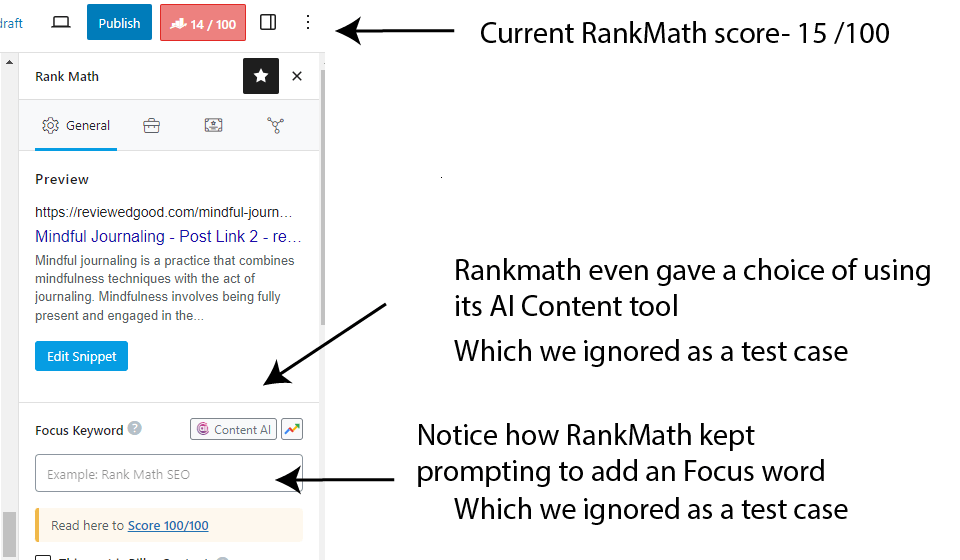
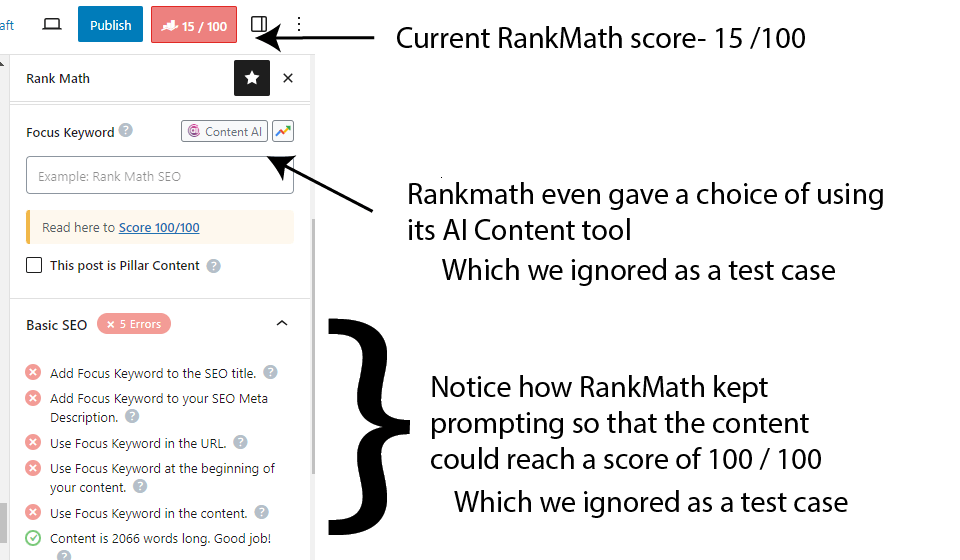
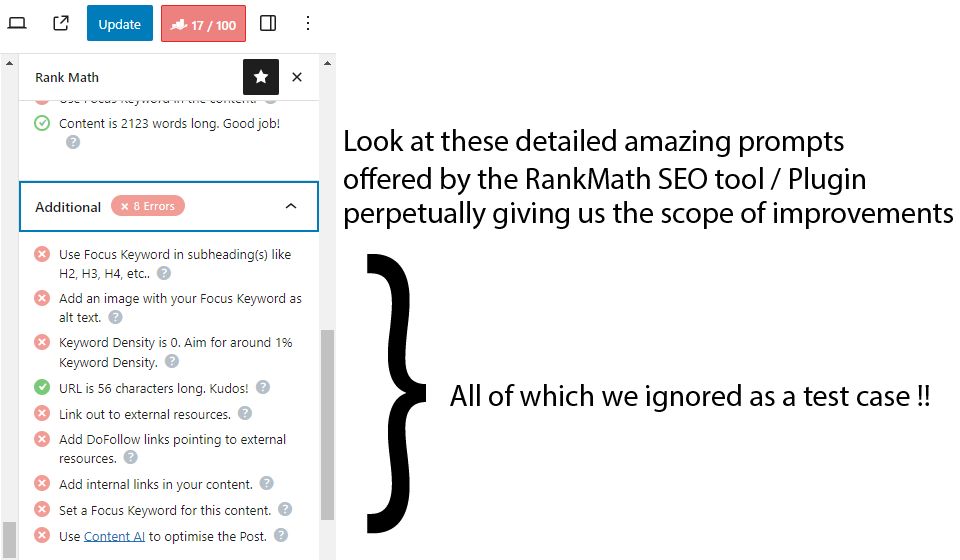
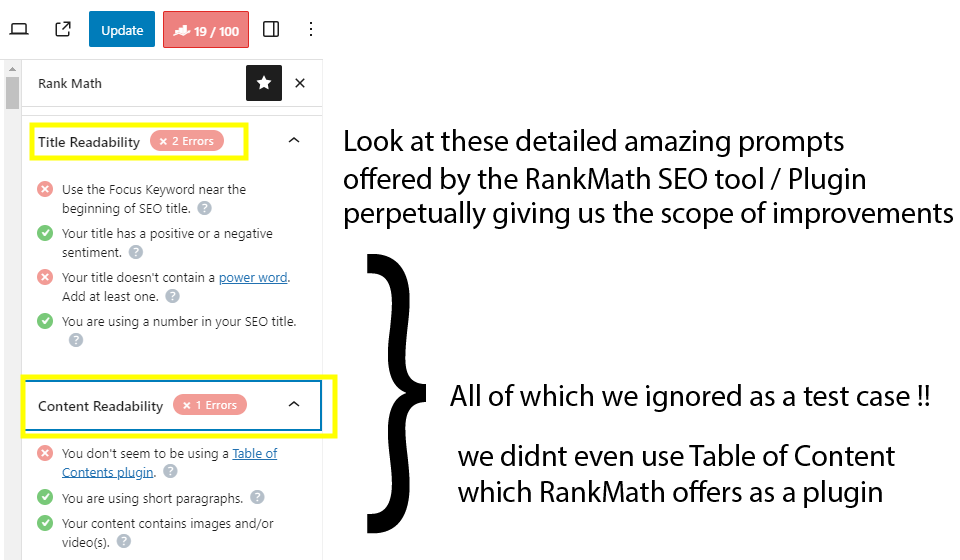
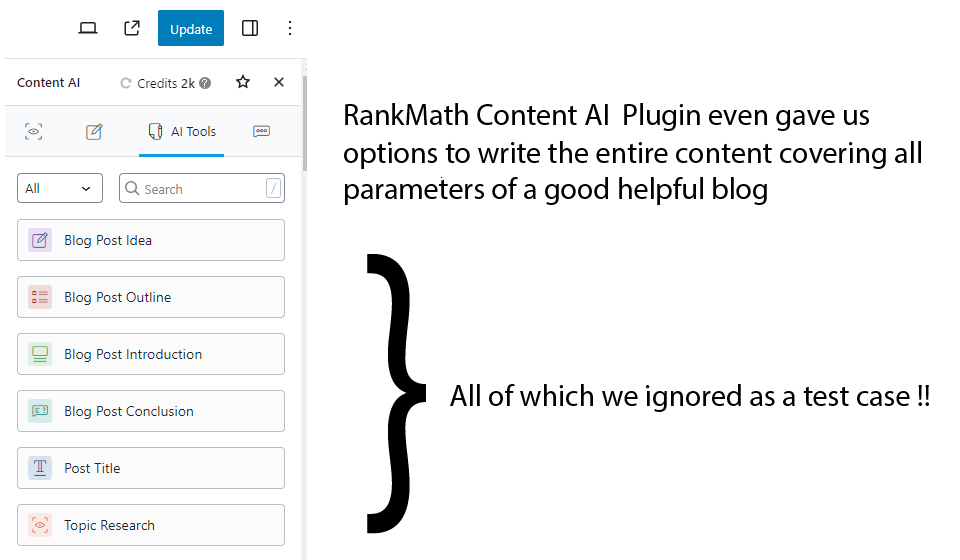
Concluding the post – Do not be that kamikaze writer !! Use guidance , instructions , tools and see your content reach where you intended it to be .
